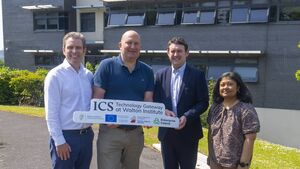Carlow tech firm aiming to tackle AI’s environmental problem

Liam Fitzgerald from the Walton Institute, Gary Evans of Feedalpha, Jim Prendergast (Walton Institute) and Dr Indrakshi Dey (Walton Institute)
CARLOW-BASED tech company Feedalpha is leading a new project aimed at tackling the significant environmental impact of artificial intelligence (AI), which has surged dramatically since tools like ChatGPT became widely available.
The project, named GreenSphere, is a collaboration between Feedalpha and researchers from the Walton Institute at South East Technological University (SETU). It aims to create a more energy-efficient AI platform, designed specifically to help smaller businesses use advanced technology without upping their carbon footprint.
Since ChatGPT was released over two years ago, it seems like everyone is dabbling in artificial intelligence, or ‘generative AI’ to be specific. It’s easy to access online tools like this to do everything from writing (dubious) poetry and essays, creating an image of, say, Donald Trump sitting on a Scrooge McDuck pile of gold, or generating fictional video clips of Carlow bringing home Sam Maguire. You can even chat with them if you’re bored with human company.
Because many of these generative AI apps have a free-to-use version, it can seem consequence-free, but the accelerating use of such technology uses huge amounts of energy and is having a negative impact on the environment.
According to recent data from research body Electric Power Research Institute, a single query to ChatGPT consumes approximately ten times more energy than a standard Google search, resulting in substantial cumulative environmental impact globally.
What’s to be done?
Feedalpha and the Walton Institute want to make AI more energy-efficient and better for the environment; GreenSphere aims to improve how digital content is created using AI, while cutting down on the large amounts of energy these systems usually use.
“AI is now at the heart of everything we do – transforming how we learn, work, make decisions and connect with one another,” said Feedalpha’s CEO Gary Evans. “We’ve seen firsthand the game-changing power and rising energy demands of current AI systems.”
In this partnership, Feedalpha shares what it’s learned about what small businesses need and how they use digital tools, while the Walton Institute brings research experience in designing algorithms and other elements of AI systems that use less power and work in smarter ways.
“Our work with Feedalpha exemplifies how Ireland’s research ecosystem can support indigenous tech companies to innovate responsibly,” said Liam Fitzgerald, ICS technology gateway manager at the Walton Institute. “GreenSphere is not just a project – it’s a model for how AI can serve both business and the environment.”




